Articles about reggae music, reviews, interviews, reports and more...
Interview: Prince Alla Part 1
- Home
- Articles
- Interviews
- Interview: Prince Alla Part 1

Interview: Prince Alla Part 1
"Tappa Zukie loved the arranging horns whereas Bertram would just sit back and let you do what you wanted to do"
Sampler
Dubbed "The Gentle Giant", Prince Alla (born Keith Blake, St Elizabeth Jamaica) is one of roots reggae's most irrepressible and warm-hearted characters. His demeanour is something of a contrast from the anguished dread-serious biblical tones of his records, which take Old Testament Stories and place them in the context of societal injustice in Jamaica and the world. His most famous records were cut in the mid seventies for Tappa Zukie's Stars and Bertram Brown's Freedom Sounds labels. Yet despite keeping busy in the last two decades recording for UK and European dub-reggae producers, where his strictly roots and culture approach is well suited, he still lives humbly in West Kingston as he has since his youthful days. Angus Taylor found the kindly veteran on fine form as he enthused about sports, music and spirituality in equal measure.
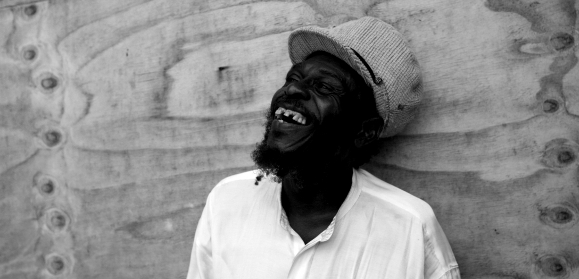
You are associated with the Greenwich Town/Farm area of West Kingston. Where were you born?
I was born in St Elizabeth but I came to Kingston when I was a little beenie baby. My people they were from the country but they just came into town to live with my grandmother and we just lived from that time until now. I was in Trench Town for a little time. I spent some time in Trench Town as a youth and then the rest of my time in Greenwich Town.
Which other singers did you grow up with?
My favourite one that I grew up with was Slim Smith. He had a girlfriend in Greenwich Town and he would come in the nights and we would go in our old car and he would sing for the whole time and I would be listening! I can't remember the exact age but he was bigger than me. I was just a little youth at that time. He was a very nice person. Loving. Every time I heard him it was just music he'd talk about. I used to call him my Sam Cooke. My Nat King Cole.
 I used to call Slim Smith my Sam Cooke. My Nat King Cole
I used to call Slim Smith my Sam Cooke. My Nat King Cole
You knew your future producer Bertram Brown as a child. What was he like?
Yes I grew up with him in Greenwich Town same way. Knew him from small and knew his whole family. He was irie but he had to work hard in a rum store, J Wray & Nephew. He was the accountant there as a little youth. Nice person. We used to go out to sea and catch fish and do all kinds of things. He was a man that could play football very well! He used to be on the outside left. Someone would pass the ball to him and I'd say, "Run! Gwaan B!" and he'd run in from the outside left and go BLOOOOMM! He was hard man because he had a good left foot. So every time we'd give him the ball he'd run in from the wing and send it in man!
How about your own football skills?
My own football skills weren't so big. I used to love the cricket! (laughs) Now and then I'd play a little football but I used to love the cricket more. (laughs) Because in those times we didn't have any pads or gear and you would get some licks! And sometimes you'd have to retire! (laughs)
You started singing in Methodist church I believe?
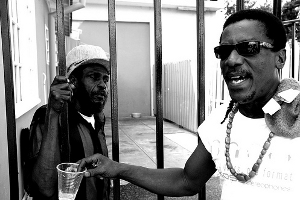 Yes because my grandmother used to go to a church that was right next door to me and she was part of the choir. So when they would have an Easter celebration or Christmas or any of those things then we would come and sing Our Father. I was so little then that I didn't know all of the words! But I used to sing it and they'd say "Nice!" so I used to love it. She used to sing tenor and it used to blow my mind to hear the high tenor with the harmonies! That's why I loved the harmony group singing too.
Yes because my grandmother used to go to a church that was right next door to me and she was part of the choir. So when they would have an Easter celebration or Christmas or any of those things then we would come and sing Our Father. I was so little then that I didn't know all of the words! But I used to sing it and they'd say "Nice!" so I used to love it. She used to sing tenor and it used to blow my mind to hear the high tenor with the harmonies! That's why I loved the harmony group singing too.
Were you religious as a youth?
I used to go to the church all the while because in those times you had to! Grandma was strict about "You have to go to church and Sunday school!" And because it was so near if I was late some teacher would descend and call over the fence and say, "Where's where's where's where's him???? Why he don't reach yet????" (laughs) so I had to go you know!
How did you enter the music business?
I used to live with my father and when I started to Ras up my hair he said, "Bwoy watch yah now. If you gwaan Ras up your hair you cyaan stay here now". So I said, "Alright" and I just went down to the Greenwich Farm fishing beach. I just started coming into the music because of the influence of Milton Henry who could play the guitar very nicely. I just said, "Yes!" and started rehearsing. I'd just left school then and I'd met Joe Gibbs. He used to have a girlfriend who lived down the bottom there and he used to come and hear me sing with Milton Henry and Soft Roy Palmer. He used to sing and he said he wanted to join the group but when he joined the group he couldn't sing so we said, "better you be a producer now". So he said, "Alright" and started producing and we did a song for him at Federal Recording Company.
 I used to live with my father and when I started to Ras up my hair he said, "Bwoy watch yah now. If you gwaan Ras up your hair you cyaan stay here now". So I said, "Alright" and I just went down to the Greenwich Farm fishing beach
I used to live with my father and when I started to Ras up my hair he said, "Bwoy watch yah now. If you gwaan Ras up your hair you cyaan stay here now". So I said, "Alright" and I just went down to the Greenwich Farm fishing beach
That was the Leaders wasn't it? Were they your first group?
Yes my brother! They were my very first group and my very first songs - everything.
The Leaders were often on flipsides of rocksteady records. Was this frustrating?
No because in those times when you were on the B side of some artist it was alright. Young ones wanted to be there. In those times people would big big you up when I said, "I end up on the flipside of here man!" In those times it wasn't a problem. It was nice. It was like if you were on a football team and you'd have a big player and say, "Woy... I play wi dem you know?"
Did you do any voicing for Joe Gibbs after the Leaders?
Yes once I think I did a song for him in '98 or '97. I did a song over Nah Go Dem Funeral. I did it over for him. And in the 2000's I did some songs for him before he died but I don't know what happened to them.
 When Joe Gibbs joined the group he couldn't sing so we said, "better you be a producer now"
When Joe Gibbs joined the group he couldn't sing so we said, "better you be a producer now"
Why did the Leaders finish?
Milton Henry migrated and went to America. Me and Roy Palmer were still there but Milton was the inspiration for me. So I joined up with Roy Palmer and his little brother named Frankie - Frankie Jones - and we started recording for Tappa Zukie.
He was always around in Greenwich Town even as a little youth. I was a bit bigger than him. He was a nice little youth back then.
But in the late sixties, before you started recording for Tappa you left West Kingston and went to the Prince Emmanuel Edwards "Bobo Dread" camp at Bull Bay.
Yes I left and went there for a few years and it was a little before I recorded for Tappa Zukie. That time was very nice at the camp man for the few years I was there. We just sang hymns and courses and we kept the Sabbath day holy and those things there.
Was bible reading a big part of your ritual?
Every day. Because I was a priest from the altar too. We had seven priests and I was one so I had to carry out services some times. So every day we had to read the bible whether you were carrying out the service or sitting down in the congregation.
Did this inspire your later songs for Tappa Zukie and Bertram Brown which draw on the stories of the Old Testament?
Yes. All of them. Man From Bosrah: because one day I read the bible and said, "Melchezidek met Father Abraham come from the slaughter with his garment dipped in blood". In those times I didn't even realize there was a place on earth named Bosrah. But I saw it in the bible and I liked that. His garment dipped in blood - blood red and I said, "Wha..." so the idea just came up and I sang off that. Melchezidek was the high priest. He had no mother, no father, no beginning of days nor ending of time.
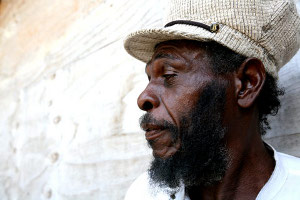 Same with all of them. Daniel In The Lions' Den - Bible. No Go Them Funeral - Bible. That was reasoning about Jesus and his disciples and how one of them said, "I can't follow you today because I have to go" and he said, "Leave that and come man". But when you really realize that what he wanted was to stray and follow Babylon system - that is the real funeral. It's not just a funeral for when somebody dies, because when somebody dies you have to bury them. The System is the real funeral. The System that tells you you have to die to go to heaven and those things. So I say, "I'm nah gonna follow dem system" so I say, "Nah go dem funeral". That is what I really mean. Not if my mother or my brother or my good friend dies I don't go. It's Babylon System that I don't follow. So I feel like it was just as Jesus was telling the disciples, "Come man, don't follow them ways. Follow me and come" it is symbolic of a funeral. But I see it bigger than that. I see it as the System is a funeral! (laughs)
Same with all of them. Daniel In The Lions' Den - Bible. No Go Them Funeral - Bible. That was reasoning about Jesus and his disciples and how one of them said, "I can't follow you today because I have to go" and he said, "Leave that and come man". But when you really realize that what he wanted was to stray and follow Babylon system - that is the real funeral. It's not just a funeral for when somebody dies, because when somebody dies you have to bury them. The System is the real funeral. The System that tells you you have to die to go to heaven and those things. So I say, "I'm nah gonna follow dem system" so I say, "Nah go dem funeral". That is what I really mean. Not if my mother or my brother or my good friend dies I don't go. It's Babylon System that I don't follow. So I feel like it was just as Jesus was telling the disciples, "Come man, don't follow them ways. Follow me and come" it is symbolic of a funeral. But I see it bigger than that. I see it as the System is a funeral! (laughs)
 When somebody dies you have to bury them. The System is the real funeral
When somebody dies you have to bury them. The System is the real funeral
How come you left the camp in 1971?
Why I left was because there started to be a little division in the camp and I didn't like division. Some man started calling themselves David House and This House and that so I just left. But the principle there was always right - it was just some of the people there would do some things. That was why I really left.
Now at the Bobo camp we didn't really play the reggae music so I left it out. But all the while Earl Chinna Smith used to look for me and say, "Bwoy, why don't you come back into the music" and all this so I said, "Alright, alright, alright...". So we did the first Freedom Sounds. We started off with Freedom Sounds and he did the first song with me. He said, "Come to Freedom Sounds" and carried me to the studio and we did a song there.
How did you get your name Prince Alla?
I loved this boxer by the name of Cassius Clay. When I was a youth that was my boxer man! Every time he boxed I'd always say, "Yes! Him gwaan beat everybody!" [Sonny] Liston, George Foreman, everybody! And you know in Jamaica they love to call you a nickname. Everybody has a nickname. If you're fat they call you Fatman. If you're slim they call you Slimma. So there was a brethren down the Farm who loved to give nicknames. He was the father for nicknames. So he said, "Yo! You feet a jump up! You name Prince Alla!" and everyone said, "YES MAN! YOU NAME PRINCE ALLA!!!!!"
Did you used to listen to Muhammad Ali's fights on the radio?
In those times I used to listen to him often and go, "I am the greatest!" and "Booma yea! We are gonna kill Foreman in Africa!" and "Joe Frazier he is a gorilla!" (laughs) As a little youth I used to listen to a thing called Radio Fusion and hear them there. In those times I hadn't seen a TV yet!
What was the atmosphere like in Jamaica when he won a big fight like Sonny Liston or George Foreman in Zaire?
It was a surprise because most people thought he couldn't win. They said Liston was a prisoner and he was big and rough and tough and beat and killed everyone! But I said, "Cassius Clay ah my boxer man!" But the biggest surprise was when he beat George Foreman too! It was like fire man! People started coming on the streets with pots and pans knocking them, "BANG! BANG! BANG! BANG! BANG!!" and you heard over and over on the radio, "I am the greatest! I am the greatest!" People used to love calling that and they used it in songs too. Prince Buster and Dennis Alcapone too! "I am the greatest!" (laughs)
 The biggest surprise was when Muhammad Ali beat George Foreman too! It was like fire man! People started coming on the streets with pots and pans knocking them, "BANG! BANG! BANG! BANG! BANG!!" and you heard over and over on the radio, "I am the greatest! I am the greatest!
The biggest surprise was when Muhammad Ali beat George Foreman too! It was like fire man! People started coming on the streets with pots and pans knocking them, "BANG! BANG! BANG! BANG! BANG!!" and you heard over and over on the radio, "I am the greatest! I am the greatest!
So when you came back from the Bobo camp it was Freedom Sounds you worked with first before Tappa Zukie?
I think it was Freedom Sounds first. We did a tune together at Randy's studio by the name of Judgement Time and another one Thank You Lord.
So after that you recorded Bosrah for Tappa Zukie at Lee Perry's Black Ark studio.
Yes, because one day I was at my home and going round my house singing this song when Tappa Zukie passed. He called me out and said, "I hear it you know! Come!" and we went inside and he said, "Please Alla! Do that song for me!" So we went up to the Black Ark studio to see Lee Scratch Perry and when I went in he said, "What you name man?" and I said, "They call me Prince Alla" so he said, "Sing the tune!" So I started singing the tune and he said, "Wha..." and he held me and started spinning me round and going all (makes weird noise)! And I thought, "This is a genius man!" So he said, "Come!" and we went in the studio with Upsetters band. I think Melodians were doing some songs the same day too.
Did they help out with the tune?
Yes one of them did - Tony Brevett. Along with Soft - my original harmony man! Because Milton Henry was still in a foreign. He was gone a long time!
What were your memories of working with Scratch?
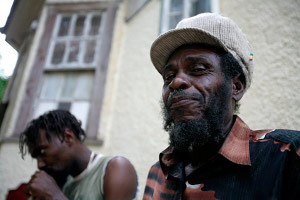 He was great. But sometimes he did things which you just looked upon and didn't understand. He used to do some things and make some moves like he'd grab a bottle and quarter fill it with water and knock it, "ting! ting! ting!" And then he'd half fill it and go, "ting! ting! ting!" Then three quarters and, "ting! ting! ting!" Then full, and then he'd put all of those sounds on tape so when he was mixing the tune he'd use them. So you'd hear ""ting! ting! ting!" then "tong! tong! tong!" "tang! tang! tang!" (Imitates the sound changing pitch and being put through effects) All these things he'd so this man was great!
He was great. But sometimes he did things which you just looked upon and didn't understand. He used to do some things and make some moves like he'd grab a bottle and quarter fill it with water and knock it, "ting! ting! ting!" And then he'd half fill it and go, "ting! ting! ting!" Then three quarters and, "ting! ting! ting!" Then full, and then he'd put all of those sounds on tape so when he was mixing the tune he'd use them. So you'd hear ""ting! ting! ting!" then "tong! tong! tong!" "tang! tang! tang!" (Imitates the sound changing pitch and being put through effects) All these things he'd so this man was great!
 Lee Perry was great. But sometimes he did things which you just looked upon and didn't understand
Lee Perry was great. But sometimes he did things which you just looked upon and didn't understand
And obviously you worked with the other master engineer King Tubby on your tunes for Freedom Sounds.
King Tubbys was great too man. When I did the song for Bertram Brown I Man Saw Great Stone at Channel One, we took it to be voiced at King Tubbys. But King Tubby didn't really record songs then. He used to use the other engineers. I think it was Scientist who took the voice. But then Tubby came round and said, "A who sing that tune there?" And because him and Bertram Brown were friends - because Bertram worked at Wray & Nephew and used to carry him liquor there and things like that - he said, "it's my artist!" and Tubby said, "Wha..." So I said, "Bwoy, King Tubbys, I know you don't really mix tune for other than yourself, but I ask you - mix it for me!" and he said, "Bwoy, I really like the tune. I'm gwaan do it". He went round the corner and came back with a little box and I said, "I'd like you to make a sound like a stone you know?" and started to play sounds until it went "BRRRRRRRRRRRRRRRR!" (Imitates thunder) and I said, "Yes!" He said he had a sound off the news, because in Jamaica you had the BBC news, and the sound went "BEEEEP!"(Imitates Tubbys test-tone). So when the tune started you'd hear "BEEEEP!" from BBC news and then you'd hear "BRRRRRRRRRRRRRRRR!" the stone and then the organ would come in. King Tubby did that! He brought the stone and the beep man! He did everything for me special!
What were the distinctive styles of Tappa Zukie and Bertram Brown as producers?
With Tappa Zukie in the studio he loved horns in his tunes! He loved to arrange and tell you to do something along to the hornsman. But Bertram Brown was a man who would mostly just 'low me up and say, "Gwaan, Prince Alla!" So I'd just say to Chinna play something like this... (Imitates melody to Children Of God) Bertram Brown would just watch! But Tappa Zukie loved his horns and would always tell Dean Fraser, Nambo and Deadly, "Try this now" "Try that now" He loved that! He was more a man who loved the arranging whereas Bertram would just sit back and let you do what you wanted to do.
And did the Soul Syndicate band do what they wanted?
Yes but all the while, Chinna and them would ask me, "What you like?" So on Bucket Go A Well they went (imitates bassline to Bucket Bottom) and I said, "Yeah man! Nice bassline!" so they played that. Because in those times, when you made a song, sometimes all of it came together - the instruments and everything. 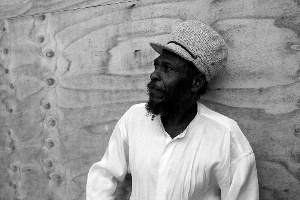 Obviously I couldn't play them but all of the ideas used to come! You make up a song and you hear all the horns play in your mind so when you go in the studio you try to get it. But sometimes it's very right and sometimes you'd say, "No man! Back weh man!" Most of the time, though, you'd say, "yes!" I would come with an idea and then Chinna would play something and it always sounded nice to me. I would say, "Yeah man. That reach! A right thing you play man!" I never really told them, "do this!" and they didn't want to do it, and they never did something I didn't like and said, "Make it stay man!" I never really went through that with Soul Syndicate or anyone else I sing with still.
Obviously I couldn't play them but all of the ideas used to come! You make up a song and you hear all the horns play in your mind so when you go in the studio you try to get it. But sometimes it's very right and sometimes you'd say, "No man! Back weh man!" Most of the time, though, you'd say, "yes!" I would come with an idea and then Chinna would play something and it always sounded nice to me. I would say, "Yeah man. That reach! A right thing you play man!" I never really told them, "do this!" and they didn't want to do it, and they never did something I didn't like and said, "Make it stay man!" I never really went through that with Soul Syndicate or anyone else I sing with still.
Did you sing for any other big producers at the time?
No, just Freedom Sounds and Tappa Zukie. I was never an artist who just sang for plenty of people. I never wanted to go sing for Duke Reid because he was a retired policeman with a big gun and he'd fire it in the air! He was rough!
 I never wanted to go sing for Duke Reid because he was a retired policeman with a big gun and he'd fire it in the air! He was rough!
I never wanted to go sing for Duke Reid because he was a retired policeman with a big gun and he'd fire it in the air! He was rough!
And he didn't like Rasta.
Yes that was the number one reason too! And I never wanted to go to Studio 1 because I heard enough rumours about him and Delroy Wilson how he abused him in certain ways. So I just used to sing for Freedom Sounds, Tappa Zukie and a few for Joe Gibbs.
Now, obviously there was a lot of political violence going on in West Kingston in the mid Seventies. How did this affect your life and your music?
Well in those times a Rastaman could go anywhere. He could pass through the PNP meeting and he could pass through the JLP meeting and nobody would trouble him. It wasn't like in the later days when Rasta would get involved in politics. So the pure war didn't trouble Rasta in those times then. You could pass through any political meeting and they would say, "A Rasta that man!" So it was easy in those times with politics. They didn't really hurt Rasta then. Of course in the later days when you come to the nineties you have some Rasta starting to get involved. But before that when I was a little youth and Rasta didn't sing those tunes everybody loved you.
Read more about this topic
Comments actually desactivated due to too much spams
Browse by categories
Recommended Articles
Latest articles
Recently addedView all
© 2007-2025 United Reggae. All Rights Reserved. Reproduction in whole or in part is prohibited. Read about copyright
Terms of use | About us | Contact us | Authors | Newsletter | A-Z














